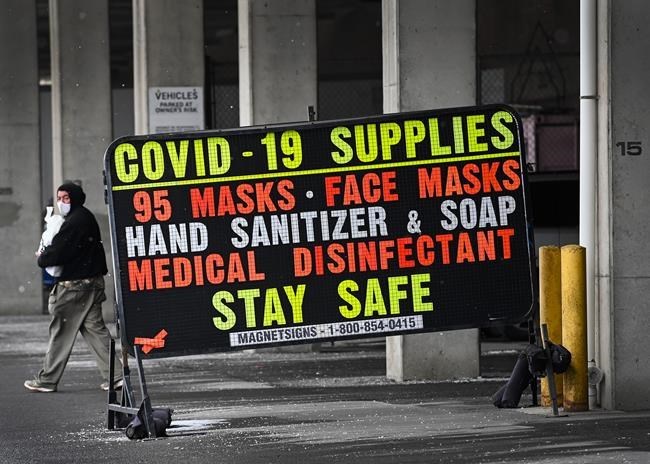
A man walks past a COVID-19 retail supplies sign during the COVID-19 pandemic in Toronto on Friday, February 5, 2021. THE CANADIAN PRESS/Nathan Denette
February 06, 2021 - 1:44 PM
TORONTO - Small businesses facing the prospect of keeping their doors closed for at least two more weeks expressed doubt on Saturday as to whether to ramp up their operations amid uncertainty over the province's tentative COVID-19 reopening plan.
Some entrepreneurs in the Toronto area, which is expected to remain under strict lockdown even as other regions of the province begin to ease public health restrictions, said they're struggling to determine whether it's worth taking on the financial and emotional risks of reopening for business without more clarity from the provincial government.
Premier Doug Ford is expected to announce on Monday that the state of emergency declared last month will be allowed to expire as scheduled on Feb. 9, according to a senior government source with knowledge of the decision. A stay-at-home order will likely remain in effect as the government transitions regions back to a colour-coded restrictions system over three weeks, said the source, who was not authorized to speak publicly.
Toronto, Peel Region and York Region are expected to be the last to make that transition on the week of Feb. 22, but the source said any sudden increase in cases could delay that plan.
George Bozikis, who runs Hendriks Restaurant & Bar in downtown Toronto, said he cannot afford preparations to re-open on Feb. 22 if there is a chance the date could be pushed back.
Each time his location reopens, he says he must spend about $20,000 to get the 290-seat restaurant up and running in any capacity. The spending includes $10,000 on perishable food, much of which goes to waste if the restaurant must abruptly close again.
"Turning a profit isn't even a question anymore. It's, 'Will we make enough money after we open to survive,'" Bozikis said in a telephone interview.
The government source has said Ontario will have an “emergency brake” in place to allow the government to quickly move a region into lockdown if it "experiences a rapid acceleration in COVID-19 transmission or if the health-care system becomes overwhelmed."
Bozikis and other business owners said they fear the proposed plan doesn't offer the ray of hope they've been seeking over the course of the pandemic. They said anything short of widespread vaccination, a mass return to office buildings and malls or a long-term “yellow” or “green” stage reopening plan may not restore a sense of safety for them or their livelihoods.
Alan Liu, who runs Toronto Thai eatery Salad King, said stopping and starting is the hardest part of keeping his business afloat at the moment.
“Our biggest concern is to make sure we open safely…. A premature start that may result in a closure and a few weeks would be incredibly challenging,” he said.
Liu says he's hesitant to reopen anything other than the restaurant's takeout business without more assurances from the province, noting the cycle of rehiring and laying off staff takes an emotional toll on all concerned.
Liu feels pressure to make staffing decisions quickly so that employees can make childcare arrangements and qualify for benefits as soon as possible.
“Number one for us, as business owners, is predictability. Jumping the gun and opening too early is not necessarily what's best for the business," Liu said.
Chris Rampen, co-owner of Bu’na coffee shop and Nunu Ethiopian, said health risks lie at the heart of his reluctance to fully reopen the business.
“At least from what the experts are telling us, we have to be extremely careful in the next little while, given these new variants that appear to be extremely contagious,” he said.
His fears resonate with Erin Gamelin, owner of Toronto pubs Louis Cifer Brew Works and Stout Irish Pub, as does frustration around the government's approach to handling the pandemic.
Gamelin said many policies seem unpredictable and arbitrary, such as allowing big box stores and schools to remain open and setting the same cap on gatherings for both large and small restaurants.
"Closing down smaller businesses becomes a credibility issue when it doesn't make logical sense," she said. "Because there has been a lack of consistency of their decision-making and policy, I think that the general public has lost confidence in those decisions that they're making."
Ontario reported 1,388 cases of COVID-19 and 45 new deaths linked to the virus on Saturday.
The province said 1,021 people are currently hospitalized with COVID-19, with 325 in intensive care and 228 of those patients on a ventilator.
Health Minister Christine Elliott said there are 455 new cases in Toronto, 288 in Peel and 131 in York Region.
Steven Del Duca, Leader of the Ontario Liberal Party, said on Saturday that Ford’s economic recovery plan must include financial support for small businesses in regions that can’t re-open.
“Doug Ford plans to announce the re-opening of Ontario’s economy ... after weeks of putting Big Box lobbyists and Amazon first while local entrepreneurs suffered,” Del Duca said in a statement. “If he’s going to re-open the economy, he needs to let small businesses lead Ontario’s economic recovery.”
This report by The Canadian Press was first published Feb. 6, 2021
— With files from Shawn Jeffords.
News from © The Canadian Press, 2021